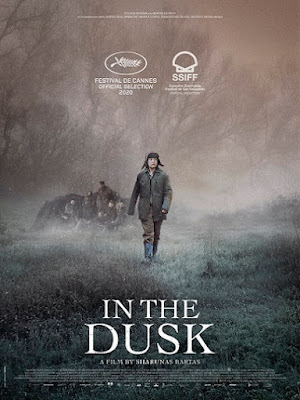Father-son relationships are often complicated. A foreign occupation will not make it any easier for Jurgis Pliauga and his adopted son Unte. The young man is drawn to the more proactive means of resistance advocated by Deacon, a leader of the Forest Brothers partisans, whom he starts to see as a competing father figure. In contrast, his father prefers to play dumb, drag his feet, and even hide, if necessary, when the new occupying authorities come calling. Of course, tragedy comes for all men of good conscience in Sharunas Bartas’s In the Dusk, which premieres today on Film Movement Plus.
The War is over, but the Lithuanians would hardly know it. From their perspective, Soviet uniforms have simply replaced those of the Germans. Supposedly, they are now part of the Soviet Union, but the reparations and protection money the Soviets extort from them clearly imply their lowly position in the Soviet hierarchy. As the owner of a sizeable farm, Pliauga is a prime target for their shake-downs and his lazy farmhand Ignas also expects to receive part of his employer’s land holdings, through the promised socialist distribution.
Both Pliauga and Unte have social and commercial dealings with the rag-tag band of partisans in the forest. Increasingly, Unte is swayed by Deacon’s greater intellectual understanding of communism, democracy, and the Cold War, as well as his willingness to fight for Lithuania’s freedom. However, Pilauga is instinctively cautious. When the local troops come looking for him, the old man hides in a secret room hidden in his barn, which obviously evokes memories of those who hid from the Germans in a similar fashion.
In the Dusk is definitely an intentionally slow and deliberate film, but it is more accessible than Bartas’s previous film Frost. Through the former, we witness the long, slow death of innocence, experienced by Unte and anyone else who might have hooped for a better life under the Soviets. The Forest Brothers are often rude and crude, but they are not wrong about the Soviets.
Neither is Pilauga. Watching the tragedy unfold, it is clear the partisans and the farmers needed a more widespread, more coordinated, and more flexible campaign of resistance. Of course, nobody looks worse than the Soviets, who are sadistic torturers. Yet, they clearly do not believe their purported ideology either. They just cynically mouth the right platitudes, while practically rolling their eyes.
Inevitably, it all ends in heartbreak, unless you are Putin or one of his Western amen chorus, like Chomsky or MTG. This is a brutally realistic film that is rooted in the muddy muckiness of the forests and farms. Cinematographer Eitvydas Doskus makes it all look appropriately dark and ominous. Yet, Bartas still gets some terrific performances from his cast, particularly Arvydas Dapsys, as the cagey but sadly dignified Pilauga.
Likewise, as Unte, Lithuanian poet Marius Povilas Elijas Martynenko convincingly carries himself as a young man ten or fifteen years younger than he really is. He and Dapsys have some truly poignant scenes together late in the film. It would be nice to see Martynenko become a huge international star, just to see how the studios would fit his name into movie posters.
In the Dusk forthrightly revisits some of the darkest days of Lithuanian history, but it is also inescapably timely. It is worth noting Bartas’s Frost was set amid Putin’s first invasion of Ukraine, in the Donbass region. That was the invasion everyone was willing to live with, because Putin would surely play nice going forward. How did that appeasement work out?
In contrast, In the Dusk is a much more pointed film than Frost and a much more accomplished one. In Bartas’s hands, the family drama and the national tragedy work in concert to amplify each other. Very highly recommended, In the Dusk starts streaming today (5/26) on Film Movement Plus.

